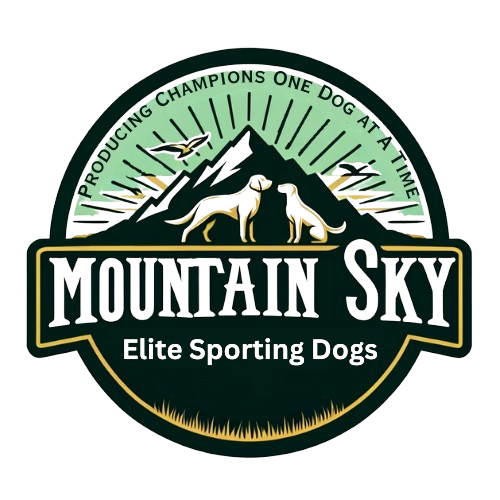
Nutrition for High-Performance Dogs: Fueling Champions
When it comes to the world of competitive dog sports, nutrition plays a pivotal role in shaping a canine athlete's performance, health, and longevity. Just like human athletes, high-performance dogs require a specialized diet tailored to meet their intense physical demands. In this blog, we’ll explore the best nutrition practices for competitive dogs, with a focus on retrievers, to help ensure they are at their peak for training and competition.
Understanding the Basics of Canine Nutrition
Before diving into the specifics for high-performance dogs, it’s important to understand the basic nutritional needs of all dogs. Canines require a balanced diet that includes proteins, fats, carbohydrates, vitamins, minerals, and water. Protein is crucial for muscle repair and growth, fats provide energy, carbohydrates supply fiber and energy, and vitamins and minerals are essential for various metabolic processes.
Special Nutritional Needs of Competitive Dogs
Increased Energy Requirements
Competitive dogs expend a lot of energy. To meet these needs, their diet typically requires a higher caloric intake than that of a non-active dog. The focus should be on high-quality proteins and fats to provide sustained energy. For retrievers in field trials, for instance, fats can constitute up to 30% of their diet, as fats are a dense source of energy and are essential for stamina.
Protein for Muscle Recovery
Proteins are the building blocks of muscle, and in the competitive dog's diet, they play a critical role in recovery and muscle maintenance. High-quality sources like chicken, beef, fish, and eggs should be staples. The amount of protein should be carefully calibrated based on the dog's weight, age, and the intensity of the physical activities they are involved in.
Carbohydrates for Quick Energy
While dogs draw most of their energy from fats, carbohydrates are also important, especially for quick energy refuels. Sources like whole grains and vegetables can provide this, along with essential fibers and nutrients. However, it’s important to select easily digestible carbohydrates to avoid gastrointestinal issues.
Hydration is Key
Water is crucial, especially for dogs involved in rigorous training and competitions. Adequate hydration supports endurance and helps prevent overheating and fatigue. Always ensure that fresh water is readily available for your dog, particularly during and after training sessions.
Tailoring Diet to the Dog’s Lifecycle
The nutritional needs of a competitive dog will change as they age. Puppies and young dogs require diets rich in calories and nutrients to support their growth and energy levels. Adult dogs need a well-balanced diet that maintains their health and fitness. Senior dogs, meanwhile, may need fewer calories if their activity level decreases but still require high-quality protein to maintain muscle mass and overall health.
Supplements for Canine Athletes
In some cases, supplements can be beneficial for high-performance dogs. These might include:
- Joint supplements such as glucosamine and chondroitin, which are popular for maintaining joint health and mobility.
- Omega fatty acids for coat health, brain function, and inflammation reduction.
- Electrolytes for dogs that engage in prolonged activities to help maintain electrolyte balance.
However, it’s crucial to consult with a veterinarian before introducing any supplements into your dog’s diet.
Putting it All Together
Creating the optimal diet for a competitive retriever or any high-performance dog involves careful consideration of their specific energy needs, health requirements, and the demands of the sports they participate in. Regular consultations with a veterinarian or a canine nutritionist are vital to tailor a diet plan that’s not only effective but also safe and healthy.
By focusing on high-quality ingredients and properly balanced nutrients, you can help ensure that your canine athlete is well-prepared to meet the challenges of their training and competitive endeavors. A well-fed dog is not only a better performer but also a happier, healthier companion.


